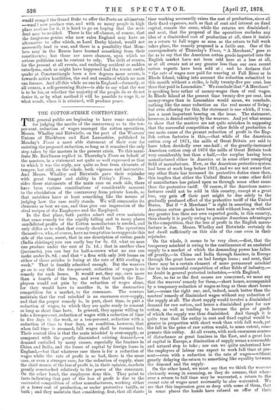DRIFTING TO WAR.
WE are drifting slowly to war, with the assent, if not of her Majesty's Government, at least of the interior Cabinet which controls it. That is the only conclusion which we are able to form from the history of the past fortnight. The negotiations, as they are called, evidently do not advance, the British Government, when any new move is made, always interposing with a difficulty, or a reservation, or a question. It appears certain, for instance, that Prince Bismarck suggested a most honourable and easy escape from all the difficulties raised about the "submission" of the Treaty of San Stefano,by suggesting a Congress for the revision of the Treaties of 1856 and 1871, before which that Treaty would have been brought merely as a document. This proposal was accepted by Russia, and would have been agreeable to all the Powers, but Great Britain rejected it, as implying that the former Treaties were not now fully binding, which of course they are not, having, like the Treaties of Vienna, been destroyed by events. No further definite proposal has been made, except one for a mutual retreat, —the Russians returning to Adrianople, and the English to Besika Bay, but this is pronounced impracticable, and from every capital we receive opinions that diplomacy has done its utmost, and that the war is now inevitable. No doubt these opinions are all the stronger because in those capitals the war is desired, the nations thinking that Great Britain has been exempted from the sufferings they have all undergone quite long enough ; but still such an accord, besides indicating the probability of war, tends to produce it. All this while, too, the two Governments principally concerned are making the most active preparations for a possible collision. The British Government is arming with a rapidity and in a way which would be reckless, did not the Ministry believe war to be at least possible. Not only have the Reserves been called out, and the export of torpedoes stopped, and 7,000 native troops been ordered to proceed to Malta, but minor preparations such as are only remem- bered on the eve of war have been completed. An "emergent indent" for 1,000 pack-saddles was received at Woolwich from Malta a day or two since, and 500 were forwarded in a single day. That is not the kind of order ever sanctioned except when work is immediately to be done, and done outside British territory, and like the preparations made to secure transport at twenty-four hours' warning, it signifies that an expedition has been de- cided on. It is even asserted—though we can scarcely believe it—that Mr. Layard has asked the American Minister at Con- stantinople, Mr. Maynard, to protect British subjects, a request which would signify that war was a foregone conclusion. On the other hand, the Russian Government has become so alarmed that it has taken the most determined precautions to guard its land route, stationing its troops through Roumania so that Rou- manian opposition shall be powerless, and pressing on Bucharest demands which, if they are correctly reported=a very doubtful
point, the Roumanians being so irritated that they believe anything—could be justified only by direct necessity. They are, moreover, calling on the Turks for the fulfilment of the Treaty by the surrender of Shumla and Batoum, in very peremptory terms, and calling out Reserves which, unless
war arrives, will press heavily on their resources. More- over, the Turks, foreseeing war, are again beginning to move. The Mahommedan Bulgarians in the Rhodope, led and assisted by soldiers left behind by Suleiman Pasha, have given the lie to all the assertions that they are unable to protect themselves, by rising in an insurrection which will require some thousands of troops to put down. And lastly, a desperate though obscure struggle is evidently going on in Constantinople itself. The British and Russian Govern- ments are contending there for influence, and the factions are so bitter that preparations for the departure of the Sultan to Broussa are believed to have again been made. As yet the struggle has gone in the Russians' favour, Ahmed Vefyk Pasha, Mr. Layard's personal friend, having resigned the Premiership, which has been accepted by Sadyk Pasha, described as a man of " colourless opinions," but clearly not so English as his rival. Add to this, that personal hostilities in Constantinople are necessarily becoming embittered, and that victory over Russia has become almost a point of honour with the British Embassy, and we have altogether the situation which almost invariably results in war. In fact it can be avoided only if both parties wish to avoid it, and on this side we can see no trace of such a wish, except among the people, who are beginning at last to express their disapproval of a policy which rejects a Congress as a possible alternative to war.
The people, however, cannot assert themselves in time, and hopeful as we have hitherto been, we can now only view the situation with the profoundest apprehensions. We do not believe in the possibility of that Russian retreat for which the war journals affect to hope ; we see that an Austrian alliance is next to an impossibility ; and we fear that the Government,
whether intentionally or not on the part of all its members, is sliding past the point where it has full self-control. The smallest accident—a Pomak success, for example, in the Rhodope, which would compel the Grand Duke to offer the Porte an ultimatum —would now produce war, and with so many people in high place anxious for it, it is hard to go on hoping that the acci- dent may be avoided. There is the off-chance, of course, that the dangerous genius who now rules England may have an alternative to offer which, as Lord Derby hinted, would not necessarily lead to war, and there is a possibility that Mem- bers may in the Recess have learned something from their constituents ; but those are mere chances, upon which no serious politician can be content to rely. The drift of events, for the present at all events, and excluding accident or sudden cataclysm, such as might have happened had the recent earth- quake at Constantinople been a few degrees more severe, is towards active hostilities, the end and results of which no man can foresee. And all this while no one in England—formerly, at all events, a self-governing State—is able to say what the war is to be for, or whether the majority of the people do or do not desire it, or by what method it will be possible to wage it, or what result, when it is attained, will produce peace.



































 Previous page
Previous page